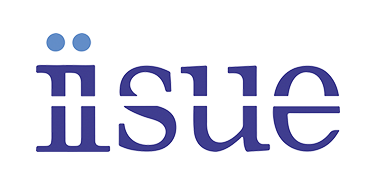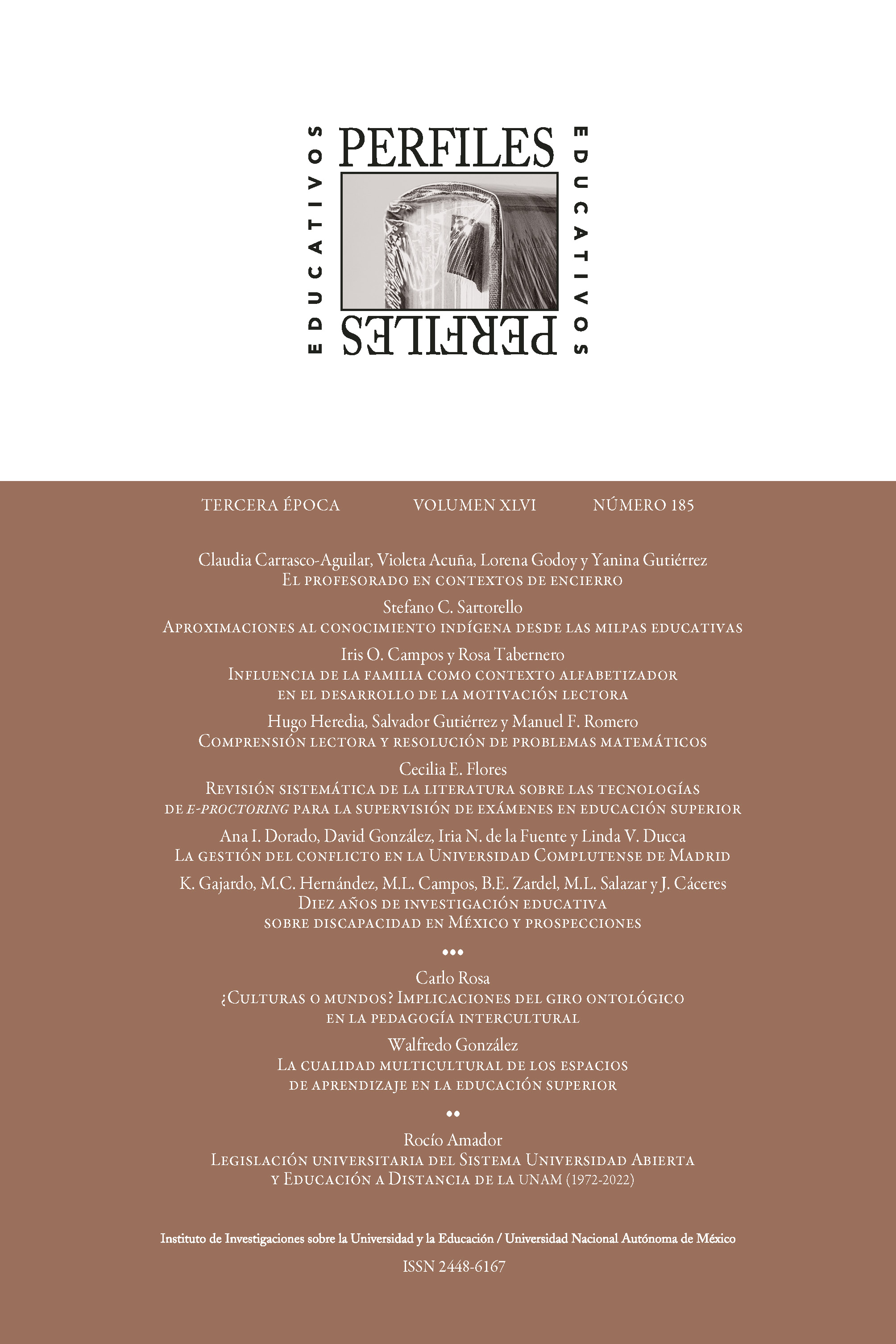La cualidad multicultural de los espacios de aprendizaje en la educación superior
Contenido principal del artículo
Resumen
El aprendizaje de los estudiantes transcurre en diferentes lugares, como los museos y los espacios virtuales, entre muchos otros, por lo que el concepto de espacio de aprendizaje permite caracterizar todas las áreas donde se puede aprender en cualquier nivel educativo. En estos espacios el estudiante puede aprender de varias culturas, incluso en las aulas, donde se dan encuentros culturales desde lo individual hasta lo social. Por ello, el objetivo de este artículo es argumentar la cualidad multicultural de los espacios de aprendizaje donde el estudiante se implica para aprender. En el cuerpo del artículo se analizan los conceptos de cultura y su relación con el aprendizaje, que permitirán analizar, en un segundo momento, la multiculturalidad en los espacios de aprendizaje escolarizados y no escolarizados. Por último, se abordan los espacios de aprendizaje cuyos integrantes provienen de culturas diferentes y las relaciones que se pueden establecer.
Descargas
Altmetric data
Detalles del artículo

Esta obra está bajo una licencia internacional Creative Commons Atribución-NoComercial-SinDerivadas 4.0.
© 2025 Universidad Nacional Autónoma de México, Instituto de Investigaciones sobre la Universidad y la Educación. Este es un artículo Open Access bajo la licencia CC BY-NC-ND (http://creativecommons.org/licenses/by-nc-nd/4.0/).
Citas
Asrizal, A., Y. Yurnetti y E.A. Usman (2022), “ICT Thematic Science Teaching Material with 5e Learning Cycle Model to Develop Students’ 21st-Century Skills”, Jurnal Pendidikan IPA Indonesia, vol. 11, núm 1, pp. 61-72. DOI: https://doi.org/10.15294/jpii.v11i1.33764
Biesta, Gert (2023), “Becoming Contemporaneous: Intercultural communication pedagogy beyond culture and without ethics”, Pedagogy, Culture & Society, vol. 31, núm. 2, pp. 237-251. DOI: https://doi.org/10.1080/14681366.2022.2164341
De Abreu Dobránszky, István y Fernando Luis González Rey (2018), “A produção de sentidos subjetivos e as configurações subjetivas na especialização esportiva”, Revista Brasileira de Psicologia do Esporte, vol. 2, núm. 2, pp. 1-18.
De-Alcântara, Rauqel y Andressa Martins do-Carmo de-Oliveira (2020), “Aportes da epistemologia qualitativa e da metodologia construtivo-interpretativa de González Rey à pesquisa educacional: um estudo de caso”, Actualidades Investigativas en Educación, vol. 20, núm. 2, pp. 1-20. DOI: https://doi.org/10.15517/aie.v20i2.41639
Díaz Gómez, Álvaro y Albertina Mitjáns Martínez (2013), “Creatividad y subjetividad: su expresión en el contexto escolar”, Diversitas: Perspectivas. Psicológicas, vol. 9, núm. 2, pp. 427-434.
Fanfan, Dany y Jeanne-Marie Stacciarini (2020), “Social-Ecological Correlates of Acculturative Stress among Latina/o and Black Caribbean Immigrants in the United States: A scoping review”, International Journal of Intercultural Relations, vol. 79, pp. 211-226. DOI: https://doi.org/10.1016/j.ijintrel.2020.09.004
Farnsworth, Kelly (2021), “Challenges in Intercultural Communication”, Vet Clin Small Anim, vol. 51, núm. 5, pp. 999-1008. DOI: https://doi.org/10.1016/j.cvsm.2021.04.017
Fleer, Marilyn, Fernando González Rey y Nikolai Veresov (2017), “Continuing the Dialogue: Advancing conceptions of emotions, perezhivanie and subjectivity for the study of human development”, en Marilyn Fleer, Fernando González Rey y Nikolai Veresov (eds.), Perezhivanie, Emotions and Subjectivity. Advancing Vygotsky’s Legacy, Perspectives in Cultural-Historical Research, Singapur, Springer, vol. 1, pp. 247-261. DOI: https://doi.org/10.1007/978-981-10-4534-9_12
Foteva, Vladimira, Joshua J. Fisher y Caitlin S. Wyrwoll (2023), “‘Well, What can I do?’: An examination of the role supervisors, peers and scientific societies can play in the multicultural student experience”, Placenta, vol. 141, pp. 65-70. DOI: https://doi.org/10.1016/j.placenta.2023.06.005
González-Fernández, Daniela, Carolina Iturra Herrera y Osvaldo Hernández González (2022), “Trabajo colaborativo entre maestros y logopedas: una revisión acerca de las barreras y de su estructura subyacente”, Revista de Investigación Educativa, vol. 40, núm. 1, pp. 165-182. DOI: https://doi.org/10.6018/rie.444821
González-Hernández, Walfredo (2016), “Las leyes de la didáctica y la realidad escolarizada. ¿Necesidad de cambio?”, Revista Latinoamericana de Estudios Educativos, vol. 44, núm. 3, pp. 85-110.
González-Hernández, Walfredo (2021), “Los espacios de aprendizaje y las formas de organización de la enseñanza: una caracterización desde la subjetividad”, Revista de Estudios y Experiencias en Educación, vol. 20, núm. 42, pp. 17-27. DOI: https://doi.org/10.21703/rexe.20212042gonzalez18
González-Hernández, Walfredo (2022a), “La competencia de la competencia en la educación superior: una visión sobre la temática”, Uni-Pluriversidad, vol. 22, núm. 2, pp. 1-14. DOI: https://doi.org/10.17533/udea.uni-pluri.343310
González-Hernández, Walfredo (2022b), “Los parques científicos tecnológicos como espacios de aprendizaje”, Revista Universidad y Sociedad, vol. 14, núm. S1, pp. 322-333.
González-Hernández, Walfredo (2022c), “The Teaching-Learning Process or the Teaching Process and the Learning Process”, Culture & Psychology, vol. 29, núm. 1, pp. 96-115. DOI: https://doi.org/10.1177/1354067X221097610
González-Hernández, Walfredo, Maritza Petersson Roldán y Marcelina Moreno García (2024), “Creative Learning in Final Year Students in Computer Engineering: A case study of the University of Matanzas”, Thinking Skills and Creativity, vol. 52, pp. 1-13. DOI: https://doi.org/10.1016/j.tsc.2024.101479
González Rey, Fernando Luis (2017), “Subjetividad, cultura e investigación cualitativa en psicología: la ciencia como producción culturalmente situada”, Liminales. Escritos sobre Psicología y Sociedad, vol. 1, núm. 4, pp. 13-36.
González Rey, Fernando (2019), “Subjectivity in Debate: Some reconstructed philosophical premises to advance its discussion in psychology”, Journal of Theory Social Behavior, vol. 49, núm. 2, pp. 212-234. DOI: https://doi.org/10.1111/jtsb.12200
Huang, Ivy S., Yoyo W.Y. Cheung y Johan F. Hoorn (2023), “Loving-Kindness and Walking Meditation with a Robot: Countering negative mood by stimulating creativity”, International Journal of Human-Computer Studies, vol. 179, pp. 103-127. DOI: https://doi.org/10.1016/j.ijhcs.2023.103107
Hui, Luotong, Kate Ippolito, Moira Sarsfield y Magda Charalambous (2023), “Using a Self-reflective ePortfolio and Feedback Dialogue to Understand and Address Problematic Feedback Expectations”, Assessment & Evaluation in Higher Education, vol. 49, núm. 3, pp. 1-14. DOI: https://doi.org/10.1080/02602938.2023.2232960
Jones, David R. (2022), “Reclaiming Disabled Creativity: How cultural models make legible the creativity of people with disabilities”, Culture & Psychology, vol. 28, núm. 4, pp. 491-505. DOI: https://doi.org/10.1177/1354067X211066816
Laceulle, Hanne y Jan Baars (2014), “Self-Realization and Cultural Narratives about Later Life”, Journal of Aging Studies, vol. 31, pp. 34-44. DOI: https://doi.org/10.1016/j.jaging.2014.08.005
Magalhães Goulart, Daniel (2017), Educação, saúde mental e desenvolvimento subjetivo: da patologização da vida à ética do sujeito, Tesis de Doctorado, Brasilia, Universidad de Brasilia.
Markey, Kathleen, Brid O’ Brien, Christiana Kouta y Claire O’ Donnell (2021), “Embracing Classroom Cultural Diversity: Innovations for nurturing inclusive intercultural learning and culturally responsive teaching”, Teaching and Learning in Nursing, vol. 16, núm. 3, pp. 258-262. DOI: https://doi.org/10.1016/j.teln.2021.01.008
Markey, Kathleen, Margaret M.Graham, Dympna Tuohy, Jane McCarthy, Claire O’Donnell, Therese Hennessy, Anne Fahy y Brid O. Brien (2023), “Navigating Learning and Teaching in Expanding Culturally Diverse Higher Education Settings”, Higher Education Pedagogies, vol. 8, núm. 1, pp. 1-20. DOI: https://doi.org/10.1080/23752696.2023.2165527
Martínez Sánchez, Alina M., Rosa Esteban Moreno y Manuel Pabón Carrasco (2022), “Análisis de las actitudes hacia el hecho multicultural en una muestra de estudiantes españoles de Magisterio”, Revista Electrónica Interuniversitaria de Formación del Profesorado, vol. 25, núm. 1, pp. 19-34. DOI: https://doi.org/10.6018/reifop.496431
Matthews, Adam, Mike McLinden y Celia Greenway (2021), “Rising to the Pedagogical Challenges of the Fourth Industrial Age in the University of the Future: An integrated model of scholarship”, Higher Education Pedagogies, vol. 6, núm. 1, pp. 1-21. DOI: https://doi.org/10.1080/23752696.2020.1866440
Morris, Michael W., Krishna Savani, Shira Mor y Jaee Cho (2014), “When in Rome: Intercultural learning and implications for training”, Research in Organizational Behavior, vol. 34, pp. 189-215. DOI: https://doi.org/10.1016/j.riob.2014.09.003
Ozer, Simon, Jonas R. Kunst y Seth J. Schwartz (2021), “Investigating Direct and Indirect Globalization-Based Acculturation”, International Journal of Intercultural Relations, vol. 84, pp. 155-167. DOI: https://doi.org/10.1016/j.ijintrel.2021.07.012
Sīlis, Jānis (2014), “Translator’s Search of Semantic Appropriateness in the Process of Cultural Transfer”, Revista Humanitariae, vol. 16, pp. 282-300. DOI: https://doi.org/10.15181/rh.v0i16.1026
Sippola, Markku, Jaanika Kingumets y Liisa Tuhkanen (2022), “Social Positioning and Cultural Capital: An ethnographic analysis of Estonian and Russian language social media discussion groups in Finland”, International Journal of Intercultural Relations, vol. 86, pp. 36-45. DOI: https://doi.org/10.1016/j.ijintrel.2021.10.005
Subero, David (2020), “Funds of Identity and Subjectivity: Finding new paths and alternatives for a productive dialogue”, Studies in Psychology, vol. 41, núm. 1, pp. 74-94. DOI: https://doi.org/10.1080/02109395.2019.1710799
Syarifah, Atik y Faqih Nabhan (2022), “Effect of Organizational Culture on Employee Performance of MSMEs With Creativity and Motivation as Mediation Variables”, Ekonomika Syariah. Journal of Economic Studies, vol. 6, núm. 2, pp. 177-188. DOI: https://doi.org/10.30983/es.v6i2.5659
Sze Goh, Adeline Yuen (2020), “Learning Cultures: Understanding learning in a school-university partnership”, Oxford Review of Education, vol. 47, núm. 3, pp. 1-17. DOI: https://doi.org/10.1080/03054985.2020.1825368
Tadesse, Abraham, Sami Lehesvuori, Hanna Posti-Ahokas y Josephine Moate (2023), “The Learner-Centred Interactive Pedagogy Classroom: Its implications for dialogic interaction in Eritrean secondary schools”, Thinking Skills and Creativity, vol. 50, núm. 3, pp. 1-12. DOI: https://doi.org/https://doi.org/10.1016/j.tsc.2023.101379
Triadó-Ivern, Xavier M., Pilar Aparicio-Chueca y Natalia Jaría-Chacón (2015), “Value Added Contributions of Science Parks– the Case of the Barcelona Scientific Park”, International Journal of Innovation Science, vol. 7, núm. 2, pp. 139-151.
Tucker King, Carie S. y Kylar S. Bailey (2021), “Intercultural Communication and US Higher Education: How US students and faculty can improve international students’ classroom experiences”, International Journal of Intercultural Relations, vol. 82, pp. 278-287. DOI: https://doi.org/10.1016/j.ijintrel.2021.04.007
Ucha, Chimobi R. (2023), “Role of Course Relevance and Course Content Quality in MOOCs Acceptance and Use”, Computers and Education Open, vol. 5, pp. 1-10. DOI: https://doi.org/10.1016/j.caeo.2023.100147
Valeeva, Rosa y Agzam Valeeva (2017), “Intercultural Education from Russian Researches Perspective”, Procedia – Social and Behavioral Sciences, vol. 237, pp. 1564-1571. DOI: https://doi.org/10.1016/j.sbspro.2017.02.246
Veraksa, Nikolay E., Nikolay N. Veresov, Aleksandr N. Veraksa y Vera L. Sukhikh (2020), “Modern Problems of Children’s Play: Cultural-historical context”, Cultural-Historical Psychology, vol. 16, núm. 3, pp. 60-70. DOI: https://doi.org/10.17759/chp.2020160307
Wei, Xiaomei, Nadira Saab y Wilfried Admiraal (2023), “Do Learners Share the Same Perceived Learning Outcomes in MOOCs? Identifying the role of motivation, perceived learning support, learning engagement, and self-regulated learning strategies”, The Internet and Higher Education, vol. 56, pp. 1-17. DOI: https://doi.org/10.1016/j.iheduc.2022.100880
Yuqi, Lin (2023), “Why They Stay and Why They Return – Understanding international graduates’ decision-making on workplace location”, Globalisation, Societies and Education, pp. 1-15. DOI: https://doi.org/10.1080/14767724.2023.2242286
Zangerle, Katharina (2023), “Learning and the ‘Change Enterprise’: Inclusion and ambivalences in an educational action research and development project”, Educational Action Research, vol. 32, núm. 3, pp. 1-19. DOI: https://doi.org/10.1080/09650792.2023.2203943
Zhang, Wei, Shiyuan Gan, Huagang He y Shengping Zhou (2022), “Effects of Teaching Behaviors on the Effectiveness of Classroom Learning Time”, International Journal of Education Technology, vol. 17, núm. 9, pp. 214-229. DOI: https://doi.org/10.3991/ijet.v17i09.30943
Zheng, Yifan, Solange Denervaud y Stephanie Durrleman (2023), “Bilingualism and Creativity Across Development: Evidence from divergent thinking and convergent thinking”, Frontiers Human Neuroscience, vol. 16, pp. 1-11. DOI: https://doi.org/10.3389/fnhum.2022.1058803







